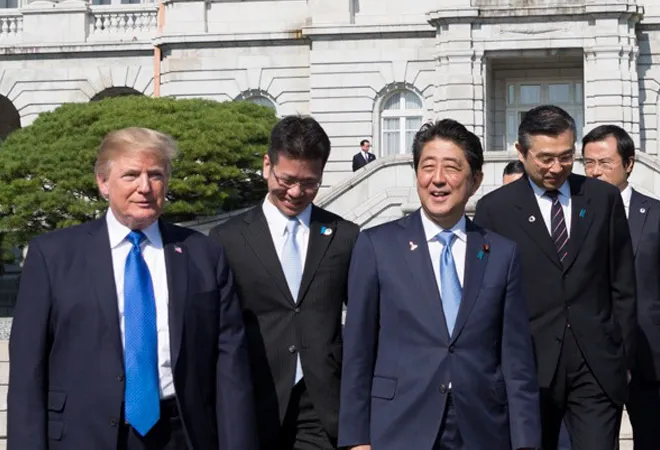-
CENTRES
Progammes & Centres
Location
Trump’s “toned down” stance on the South China Sea issue, his emphasis on “America first” policy and his soft attitude towards China have made many Japanese leaders suspect that the US is retreating from Asia.

President Donald Trump’s first official trip to Asia covering Japan, South Korea, China, Vietnam and the Philippines concluded on a note that sent mixed messages to his allies and partners. During the trip, he participated in several meetings including the APEC, ASEAN — US summit and the East Asia Summit.
Carefully avoiding to touch on controversial issues, like Senkaku Islands and the South China Sea, Trump reiterated American preference for bilateralism and made a public declaration on his ‘America first’ policies as against globalisation. His first so-called vision statement on Asia did not adequately reassure the Asian allies and partners on Washington’s commitment to the security of the region. It fell far short of their expectations.
For instance, in his summit meeting with the ASEAN countries, there was a great expectation that he would make a categorical commitment to his allies and partners against China’s constructing and militarising artificial islands in the disputed region. As widely reported in the media, in his summit meeting with the ASEAN countries, there was no specific reference either to the UN arbitral court’s verdict or to China’s illegal construction of artificial islands. During his visit to Vietnam, Trump’s offer to “mediate” in the South China Sea dispute deeply disappointed the Vietnamese hosts.
The ASEAN-China summit held in Manila also witnessed a similar scene. China is reported to have dominated the discussions which were centered on the drawing up of a code of conduct in the disputed waters. Though there was a provisional agreement to start the negotiations sometime during early 2018, participants could not come to an agreement on whether to make the code of conduct binding legally as claimed by countries like Vietnam.
On the other hand, the Philippines and Malaysia were inclined to pursue a more pro-China stance. China’s increasing economic clout due to its bulging trade and its Belt and Road Initiative (BRI) has sharply divided the ASEAN and brought about a basic change in the attitudes of countries like the Philippines. The Philippines, the present ASEAN chair, took a soft position on the South China Sea issue and thereby weakened the ASEAN cause. President Rodrigo Duterte showed great inclination to build “friendship” with China and “toned down” the South China Sea issue.
It is against this backdrop, one has to examine the meeting that took place between Japanese Prime Minister Shinzo Abe and the top two Chinese leaders in quick succession. The meeting between Abe and Chinese President Xi Jing pin on the sidelines of the APEC conference surprisingly generated a great deal of hope for better relations between the two.
Similar such meetings on the sidelines of international gatherings in the past were marked by a lack of warmth on the part of President Xi. But this time, the bilateral dynamics had somewhat changed. Both Abe and Xi had emerged stronger politically in their respective countries — the former having won the lower house election with a massive majority and the latter having emerged more powerful following the 19th Party Congress. When Xi expressed a desire to make “a new start” in the bilateral relations, it came as a pleasant surprise to Abe.
Abe’s next meeting with Chinese Premier Li Keqiang in Manila on 13 November, within a couple of days after the Abe-Xi meeting, reinforced the optimism for improved relations. Li told Abe that both countries “must work together to make the momentum of improvement of bilateral relations into something solid.” Both Li and Abe agreed to make arrangements for holding a trilateral summit with South Korean President in Tokyo soon. Since the advent of Abe as prime minister, neither Li nor Xi has made an official visit to Japan. In 2018 both countries are set to commemorate the 40th anniversary of the bilateral peace treaty, and Abe would look forward to Xi ‘s visit to Japan on the occasion.
As many analysts point out, the unpredictable style of President Trump has also created some new space for possible cooperation between Japan and China. The need to keep North Korea under control is a strong binding factor between the US, China and Japan. In his talks with Abe, Trump did not seriously discuss Japan’s post-election constitutional and defence policies. His insistence that Tokyo purchases “massive amounts of military equipment” from the US to reduce its trade surplus dismayed the Japanese leaders.
From the Japanese side, it was pointed out that Japan was already spending a great deal on purchasing US weapons and equipment. But what disappointed Tokyo most was that at a time when Abe is trying to create a favourable climate for constitutional amendments, it was hardly the time for Trump even to appear to be forcing huge military expenditures on Japan.
Trump’s “toned down” stance on the South China Sea issue, his emphasis on “America first” policy and his soft attitude towards China have made many Japanese leaders suspect that the US is retreating from Asia. They are also worried that given the warmth that Trump showed to Xi during his visit, both the US and China could develop a stronger rapport to the exclusion of Japan. From the Chinese viewpoint, if the US retreats, it would be an advantage for Beijing to exert its influence with Japan as less of the hostile power.
This commentary originally appeared in WION.
The views expressed above belong to the author(s). ORF research and analyses now available on Telegram! Click here to access our curated content — blogs, longforms and interviews.

K.V. Kesavan (1938 2021) was Visiting Distinguished Fellow at ORF. He was one of the leading Indian scholars in the field of Japanese studies. Professor ...
Read More +